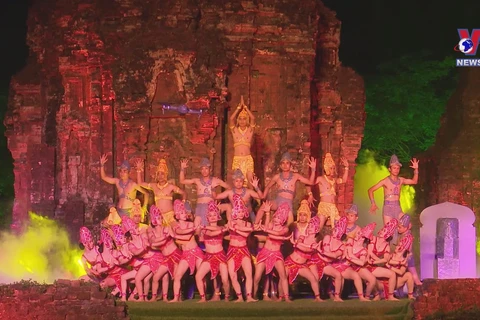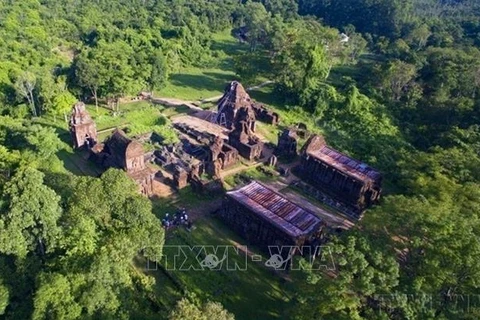Quang Nam (VNA) – The management board for My Son world cultural heritage site is coordinating with relevant parties in planting markers to delineate the boundary between the landscape conservation area and local residents' cultivation land to prevent encroachment and preserve the habitats of animals and plants in the conservation area.
The landscape protection zone for the My Son Sanctuary, a world cultural heritage site in the central province of Quang Nam, covers more than 1,160ha of land, including over 1,100ha of natural forests, in Duy Phu and Duy Hoa communes of Duy Xuyen district.
Forests in this zone are currently home to 37 mammal species, including some listed in the Vietnam Red Data Book like Sunda slow loris, Sunda pangolin, wildcat, and small Indian civet.
They also harbour 238 plant species, including critically endangered ones such as “cho den” (Parashorea stellata), “gien trang” (Xylopia pierrei), “thanh nganh nam” (Cratoxylum cochinchinense), and “thanh nganh dep” (Cratoxylum formosum).
In addition to border demarcation and marker planting, the management board has also coordinated with schools to regularly organise education sessions to raise awareness in the community about conservation and prevention of illegal hunting and exploitation, thus contributing to the protection of historical and cultural relic sites, conservation and development of forest ecosystems, biodiversity conservation and sustainable development.
Once the religious and political capital of the Champa Kingdom, My Son Sanctuary is located within a hilly landscape in Duy Phu commune of Duy Xuyen district, about 70km southwest of central Da Nang city and 40km from Hoi An ancient town of Quang Nam.
The sanctuary, comprising of eight groups of 71 monuments built between the 7th and the 13th century, was recognised as a world cultural heritage site by UNESCO in 1999./.
The landscape protection zone for the My Son Sanctuary, a world cultural heritage site in the central province of Quang Nam, covers more than 1,160ha of land, including over 1,100ha of natural forests, in Duy Phu and Duy Hoa communes of Duy Xuyen district.
Forests in this zone are currently home to 37 mammal species, including some listed in the Vietnam Red Data Book like Sunda slow loris, Sunda pangolin, wildcat, and small Indian civet.
They also harbour 238 plant species, including critically endangered ones such as “cho den” (Parashorea stellata), “gien trang” (Xylopia pierrei), “thanh nganh nam” (Cratoxylum cochinchinense), and “thanh nganh dep” (Cratoxylum formosum).
In addition to border demarcation and marker planting, the management board has also coordinated with schools to regularly organise education sessions to raise awareness in the community about conservation and prevention of illegal hunting and exploitation, thus contributing to the protection of historical and cultural relic sites, conservation and development of forest ecosystems, biodiversity conservation and sustainable development.
Once the religious and political capital of the Champa Kingdom, My Son Sanctuary is located within a hilly landscape in Duy Phu commune of Duy Xuyen district, about 70km southwest of central Da Nang city and 40km from Hoi An ancient town of Quang Nam.
The sanctuary, comprising of eight groups of 71 monuments built between the 7th and the 13th century, was recognised as a world cultural heritage site by UNESCO in 1999./.
VNA























